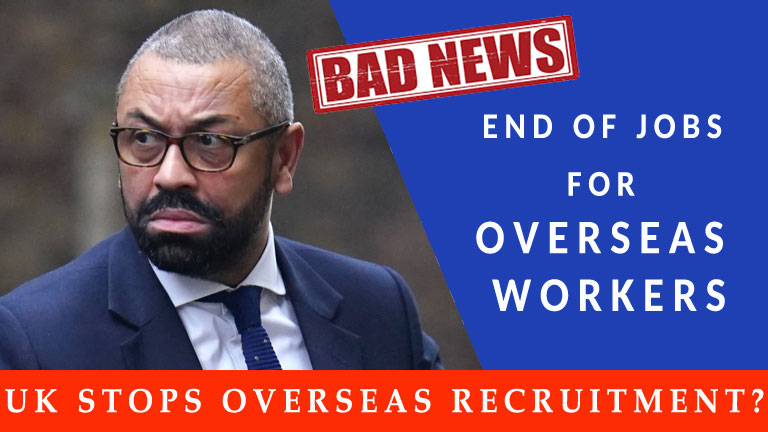No More jobs for overseas workers in uk: British Jobs for British People Only
No More jobs for overseas workers in uk : “It’s not fair when cheap labor from overseas undercuts British workers. To protect them, we will cut cheap overseas labor. That is reducing the salaries of British workers. We will prioritise British employment first over overseas employment, and will ensure that only the best and brightest are taken from overseas that can contribute to the growth of our economy. All companies should therefore employ British workers first before any overseas worker. This will help protect the British people and meet up with what they want.” Home Secretary James Cleverly

The UK government has recently been making headlines with its focus on prioritising British workers in the job market. This shift in policy, championed by Home Secretary James Cleverly and Prime Minister Rishi Sunak, alongside the Minister of Agriculture’s call for automation to replace migrant labour, has sparked a national conversation about immigration and the future of work. While this is still making headlines, reforms UK party has suggested they should increase the tax for sponsoring overseas employment from 13.5% to 20.5%, arguing that this will discourage all foreign employment and will match British workers for British jobs and stop overseas employment completely.
All these policies are discouraging overseas employment, despite the fact that it’s coming from different political parties. Hence, in today’s post, we will let you know why the UK may no longer recruit migrant workers and will like to prioritise British employment over migrant employment.
The British Jobs for British People narrative. The government’s rhetoric has centred around the idea of British jobs for British people, implying a desire to restrict employment opportunities for foreign citizens. This has been seen in occasions where top UK companies started turning down job offers of overseas workers, saying they could no longer sponsor them under new salary rules. Also, with multiple announcements of UK’s Home Secretary and UK’s Prime Minister saying they want to prioritise employment for British people and stop overseas reliance.
Also, the Minister of Agriculture announced they want to encourage British people to take jobs in the agricultural sector by sponsoring them and setting out a budget to manufacture robots that can replace overseas workers. Another case that just spanked up recently is the UK Reforms Party, proposing a 8% tax increase from the current tax of overseas companies sponsors tax that is, from 13.5 to 20.5%. All these strategies and proposal, all on the discouraging of overseas employment in the UK and making it possible for British jobs for British people. This narrative has been met with mixed reactions, with some praising the government’s commitment to domestic workers and others expressing concerns about potential xenophobia and the impact on the UK’s economy.
Several concrete policy changes have also been implemented to prioritise British workers. Some of them includes focus on automation. The government has announced plans to invest in automation and robotics, aiming to replace low skilled migrant labour with machines in sectors like agriculture and hospitality. Stricter border controls the government has tightened border controls and increased enforcement measures to curb illegal immigration. Increased salary threshold for skilled worker visas.
The minimum salary required for skilled workers coming to the UK has been significantly raised, making it more difficult for foreign workers to compete for certain jobs. Proponents of the government’s policy argue that it is necessary to protect British jobs and ensure that domestic workers have a fair chance in the job market. They also highlight concerns about the potential for wage depression and exploitation of migrant workers. Additionally, some argue that automation is simply a natural progression of technological advancement and will ultimately benefit the economy.
Critics of the government’s approach raise several concerns, saying the focus on British jobs for British people, language can be seen as exclusionary and discriminatory, potentially fostering an atmosphere of hostility towards foreign workers. Many sectors, particularly agriculture and hospitality, rely heavily on migrant labour. Restricting access to this workforce could lead to labour shortages, price increases and even business closures. Replacing human workers with machines raises ethical questions about the future of work and the potential for job displacement.
The British Jobs for British people narrative has ignited a national debate about immigration, the future of work, and the UK’s economic and social fabric. It is crucial to engage in open and constructive dialogue to ensure that the government’s policies are implemented in a way that benefits all citizens. To me, the government should restrict employment of unqualified overseas workers and can retain the labour of highly skilled workers because those are the ones that will boost the economy. So what are your own thoughts on this? Could this be a good step that will solve the migrant problem in the UK? Let us know in the comment section below. Don’t forget to follow our whatsapp channel for more on UK Visas and Immigration updates.
UK ELECTION 2024 &IMMIGRATION NEWS UPDATES
Indian carers in the UK risk deportation; there is a substantial decline in visa applications
Big Changes to UK Immigration! New PSW Visa Updates, Student Visa Rules, Net Migration 2024
JOIN WITH US WHATSAPP CHANNEL: https://whatsapp.com/channel/0029Va4bIhd6GcGCVFJLgE2L
